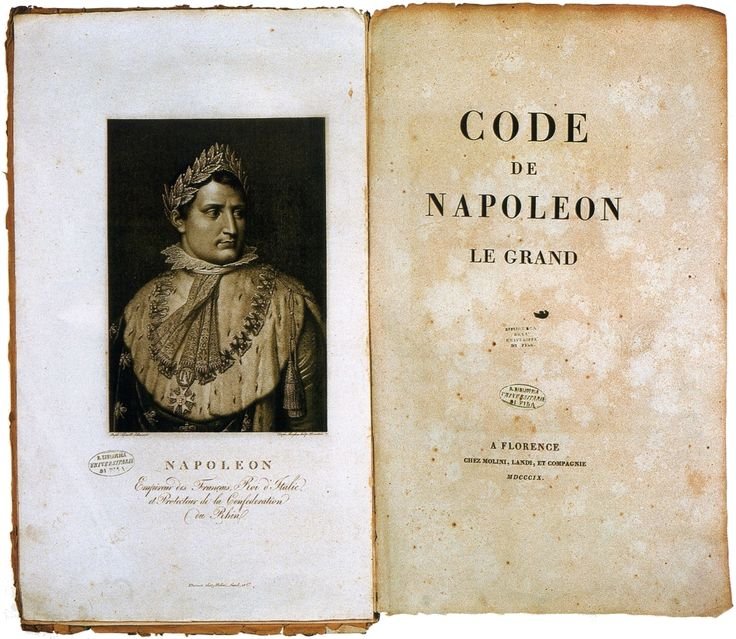Napoleonic Code: Why Was One Of The Most Influential Civil Codes Flawed?
A. Sutherland - AncientPages.com - Napoleonic Code was the French Civil Code introduced under Napoleon I on 21 March 1804.
It was the first consistent set of laws concerning criminal and commercial law, property, the family, colonial affairs, and individual rights, given by Napoleon to his people living in post-revolutionary France. The Code eliminated feudalism, supported religious tolerance, and introduced other liberal European reforms.
It is a set of organized laws, considered one of Napoleon's most essential and lasting legacies. The French military commander and political leader Napoleon Bonaparte (1769–1821) was inspired by Roman law and principles of the French Revolution to create this progressive legal system,
It has been generally considered a progressive legal system reflecting broad-minded values. The Code required that for laws to be applied appropriately, secret laws were ended. Ex post facto laws were invalidated, and procedures were needed to make the application of the rules fair.
Unfortunately, colonial slavery was reintroduced. The Code was modified and widely adopted outside France in Europe and the Western Hemisphere.
However, the Napoleonic Code made the authority of men over their families stronger, deprived women of any individual rights, and reduced the rights of illegitimate children.
The Code may not have been favorable for women, historians say.
Napoleonic Code And Women
The Code made women legally and economically dependent on men. Women acquired their husbands' nationality upon marriage and had to reside where their husbands desired. The Code guaranteed the supremacy of the man over his wife and children; the husband was the ruler of the household.

Code de Napoleon Le Grand/ The Napoleonic Code. Source
In "Changing Lives: Women in European History Since 1700", Bonnie G. Smith writes:
"Women could not participate in lawsuits or serve as witnesses in court or as witnesses to civil acts such as births, deaths, and marriages. Such a reduction in a woman's civil status enhanced that of the individual male.
Moreover, the Code reduced, if not eliminated, male accountability for sexual acts and thrust it squarely on women. For example, men were no longer susceptible to paternity suits or legally responsible for the support of illegitimate children.
Economically, women were weakened if they bore illegitimate children. Men, on the other hand, were not so affected if they fathered them. Finally, female adultery was punished by imprisonment and fines unless the husband relented and took his wife back.
Men, however, suffered no such sanctions unless they brought their sexual partners into the home. The sexual behavior of women was open to scrutiny and prescribed by law, whereas that of men, almost without exception, had no criminal aspect attached to it.
Thus, "male sexuality was accepted with few limitations, but women's was only acceptable if it remained within strict domestic boundaries." (Bonnie G. Smith, Changing Lives: Women in European History Since 1700)
The abolition of divorce by mutual consent amounted to a significant regression for French women.
- A woman cannot contract a new marriage until ten months have elapsed from the dissolution of the preceding marriage.
- The wife may demand a divorce on the ground of adultery in her husband when he shall have brought his concubine into their shared residence.
- The married parties may reciprocally demand divorce for outrageous conduct, ill-usage, or grievous injuries, exercised by one of them towards the other. 1
As the Napoleonic Code strongly influenced many legal systems in Europe and the New World, it also set the terms for treating women widely. Napoleon was pleased that his new laws had been spread throughout the empire, and said late in his life:
'Waterloo will wipe out the memory of my forty victories, but that which nothing can wipe out is my Civil Code. That will live forever.'
An original copy of the Napoleonic Code is stored in the Historisches Museum der Pfalz in Speyer, Germany.
Written by – A. Sutherland - AncientPages.com Senior Staff Writer
Updated on January 1, 2024
Copyright © AncientPages.com All rights reserved. This material may not be published, broadcast, rewritten or redistributed in whole or part without the express written permission of AncientPages.com
Expand for referencesReferences:
Smith B. G. The Oxford Encyclopedia of Women in World History
- Philip G. Dwyer, Napoleon and Europe
More From Ancient Pages
-
 Black Granite Statue Of King Amenhotep III Accidentally Recovered
Archaeology | Jan 1, 2016
Black Granite Statue Of King Amenhotep III Accidentally Recovered
Archaeology | Jan 1, 2016 -
 On This Day In History: Mount Tambora Volcano Begins A Three-Month-Long Eruption – On Apr 10, 1815
News | Apr 10, 2017
On This Day In History: Mount Tambora Volcano Begins A Three-Month-Long Eruption – On Apr 10, 1815
News | Apr 10, 2017 -
 Unearthing Vadnagar And The Search For Hueng Tsang’s 10 Monasteries
Archaeology | Dec 11, 2015
Unearthing Vadnagar And The Search For Hueng Tsang’s 10 Monasteries
Archaeology | Dec 11, 2015 -
 How Ancient Seascapes Shaped The Genetic Structure Of European Populations
Archaeology | May 20, 2022
How Ancient Seascapes Shaped The Genetic Structure Of European Populations
Archaeology | May 20, 2022 -
 Kalaripayattu – 3,000-Year-Old Indian Martial Art From Which Kung Fu And Karate Emerged
Ancient History Facts | Sep 6, 2020
Kalaripayattu – 3,000-Year-Old Indian Martial Art From Which Kung Fu And Karate Emerged
Ancient History Facts | Sep 6, 2020 -
 Apedemak: Did The Three-Headed Lion War God Of Kush Originate From Ancient India?
Featured Stories | Jul 21, 2021
Apedemak: Did The Three-Headed Lion War God Of Kush Originate From Ancient India?
Featured Stories | Jul 21, 2021 -
 ‘The Domesday Book’ Of William I The Conqueror: Detailed Register Of ‘Who Owned What’ In England
Ancient History Facts | Jan 11, 2017
‘The Domesday Book’ Of William I The Conqueror: Detailed Register Of ‘Who Owned What’ In England
Ancient History Facts | Jan 11, 2017 -
 On This Day In History: Japanese Raid On The United States Navy At Pearl Harbor – On Dec 7, 1941
News | Dec 7, 2016
On This Day In History: Japanese Raid On The United States Navy At Pearl Harbor – On Dec 7, 1941
News | Dec 7, 2016 -
 Ancient City Of Gordium, Gordian Knot And Skeleton In Tumulus Of King Midas
Civilizations | Sep 20, 2018
Ancient City Of Gordium, Gordian Knot And Skeleton In Tumulus Of King Midas
Civilizations | Sep 20, 2018 -
 Another Franklin Expedition Crew Member Identified
Archaeology | Sep 26, 2024
Another Franklin Expedition Crew Member Identified
Archaeology | Sep 26, 2024 -
 The Assyrian Siege Ramp And Breached Walls At Canaanite City Of Lachish – Studied
Archaeology | Nov 10, 2021
The Assyrian Siege Ramp And Breached Walls At Canaanite City Of Lachish – Studied
Archaeology | Nov 10, 2021 -
 Early Farmers On The Baltic Coast Incorporated Fish Into Their Diets 6,000 Years Ago
Archaeology | Oct 17, 2023
Early Farmers On The Baltic Coast Incorporated Fish Into Their Diets 6,000 Years Ago
Archaeology | Oct 17, 2023 -
 Dance Was A Gift Of The Gods To Ancient Greeks
Featured Stories | Oct 4, 2021
Dance Was A Gift Of The Gods To Ancient Greeks
Featured Stories | Oct 4, 2021 -
 Unicorns In Southern Africa: The Fascinating Story Behind One-Horned Creatures In Rock Art
Featured Stories | Jun 24, 2023
Unicorns In Southern Africa: The Fascinating Story Behind One-Horned Creatures In Rock Art
Featured Stories | Jun 24, 2023 -
 80,000-Year-Old Bone Tools Discovered In South Africa Sheds New Light How Homo Sapiens Evolved
Archaeology | Dec 5, 2022
80,000-Year-Old Bone Tools Discovered In South Africa Sheds New Light How Homo Sapiens Evolved
Archaeology | Dec 5, 2022 -
 Mysterious Mohenjo Daro Was Home To An Unknown Advanced Civilization Far Ahead Of Its Time
Civilizations | Apr 2, 2014
Mysterious Mohenjo Daro Was Home To An Unknown Advanced Civilization Far Ahead Of Its Time
Civilizations | Apr 2, 2014 -
 Extremely Rare Roman Cavalry Parade Mask Discovered In Romania
Archaeology | Feb 8, 2023
Extremely Rare Roman Cavalry Parade Mask Discovered In Romania
Archaeology | Feb 8, 2023 -
 Ancient Roman Women Wore Bikini In 1400 B.C.
Ancient History Facts | Jul 17, 2017
Ancient Roman Women Wore Bikini In 1400 B.C.
Ancient History Facts | Jul 17, 2017 -
 Many Roman Citizens Joined The Huns And Preferred Their Nomadic Lifestyle – New Study
Archaeology | Apr 4, 2017
Many Roman Citizens Joined The Huns And Preferred Their Nomadic Lifestyle – New Study
Archaeology | Apr 4, 2017 -
 Riddle Of The Hanging Gardens Of Babylon – Ancient Place Still Shrouded In Mystery – Part 1
Featured Stories | Jun 7, 2019
Riddle Of The Hanging Gardens Of Babylon – Ancient Place Still Shrouded In Mystery – Part 1
Featured Stories | Jun 7, 2019

